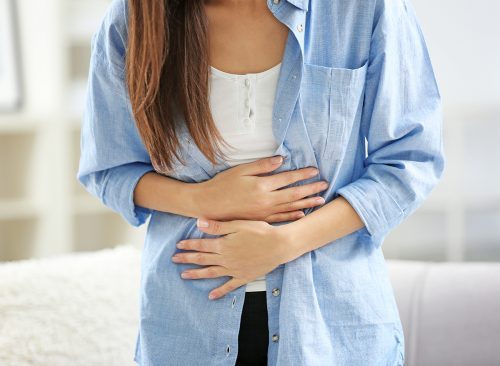Listeria Outbreak Has Hit 10 States—These Are the Warning Signs of Listeriosis
People over 65 and those with chronic conditions need to be extra careful, doctors say.

The U.S. is experiencing a listeriosis outbreak, with 10 states currently affected, according to the Centers for Disease Control and Prevention (CDC). Although no one has died and only 10 have been hospitalized as of publication, the CDC notes that "the outbreak may not be limited to the states with known illnesses, and the true number of sick people in this outbreak is likely higher than the number reported." That's because some people aren't tested for listeriosis and get better on their own, they write. Still, in light of this outbreak, which has affected people across the country, from California to New York, it's important to know the listeria symptoms to watch out for.
If you've ever been pregnant, then you've likely heard of listeriosis before. A food-borne illness caused by the bacteria Listeria monocytogenes, it's the reason people are urged to avoid eating soft cheeses and other unpasteurized dairy products during pregnancy—but anyone can contract listeriosis. The World Health Organization (WHO) reports that listeriosis is "a relatively rare disease," but the "the high rate of death associated with this infection makes it a significant public health concern."
Public health officials are interviewing those who've gotten sick as part of their ongoing investigation into the issue, but "a specific food item has not yet been identified as the source of this outbreak," the CDC reports.
"Those most at risk for contracting listeriosis include pregnant women, newborns, adults aged 65 and older, people with weakened immune systems due to medical treatments such as chemotherapy or HIV/AIDS therapy, and people with chronic illnesses like diabetes," says Peter Michael, MD, Chief Medical Officer of VUE. He shared his tips on avoiding listeriosis, as well as some common—and less common—signs of infection. Read on to find out how you might feel if you have listeriosis, and how to sidestep the current outbreak.
READ THIS NEXT: Customers Claim This Popular Cereal Is Making Them Sick.
Certain foods are more likely to result in listeria poisoning.

Who can resist a well-crafted charcuterie board overflowing with Brie, prosciutto, and melon? Unfortunately, some of those very foods are often the culprits behind a listeria outbreak.
"People are most likely to contract listeriosis from eating contaminated food," Michael tells Best Life. "This is especially true with foods such as unpasteurized milk or soft cheeses, processed meats like hot dogs and deli meats, seafood, sprouts, cantaloupe, and other unpasteurized juices."
According to the CDC, symptoms of listeriosis usually start within two weeks after eating contaminated food, "but may start as early as the same day or as late as 10 weeks after."
READ THIS NEXT: Never Wash These Vegetables Before Eating Them, Experts Warn.
Listeriosis can cause a fever, muscle aches, headache, and a stiff neck.

You might expect a case of food poisoning to result in vomiting and diarrhea, but those aren't the main symptoms Michael says to watch for. If you've eaten food contaminated with Listeria monocytogenes, he says that fever, muscle aches, headache, and a stiff neck are the first signs you may notice.
The CDC is tracking cases of the current outbreak, and advises that if you become ill with listeriosis, "local or state health officials may contact you to find out what you ate in the month before you got sick. They may also ask for copies of receipts, your shopper card number, or leftover food for testing."
People may also experience confusion, loss of balance, nausea, and diarrhea.

Of course, listeriosis is a food-borne illness, so it makes sense that "in some cases it can cause nausea and diarrhea," Michael says. However, he lists "confusion and loss of balance" before digestive distress when asked about the most common symptoms of listeria poisoning.
If you have any combination of fever, achiness, dizziness, brain fog, or upset stomach and think it may be related to eating listeria-laden food, contact your healthcare provider right away. "Listeriosis can be treated if diagnosed early," the WHO writes. "Antibiotics are used to treat severe symptoms such as meningitis. When infection occurs during pregnancy, prompt administration of antibiotics prevents infection."
For more health news sent directly to your inbox, sign up for our daily newsletter.
Safe food-handling practices help protect against listeria contamination.

When you're at a party or a restaurant, there's little you can do to ensure the food you're served is listeria-free. But if you're eating at home, practicing safe food-handling techniques is the best way to stay healthy, Michael says. "This includes washing raw fruits and vegetables before eating them, cooking all meats thoroughly, separating cooked foods from uncooked foods, avoiding unpasteurized dairy products, avoiding soft cheeses made from raw milk, reheating leftovers thoroughly, storing cold foods at or below 38°F, and avoiding pre-prepared sandwiches made with deli meats."
Meanwhile, if you want to play it safe, it might be best to avoid soft cheeses and other foods that are more prone to carry listeria—at least while this outbreak is active in the U.S.





















